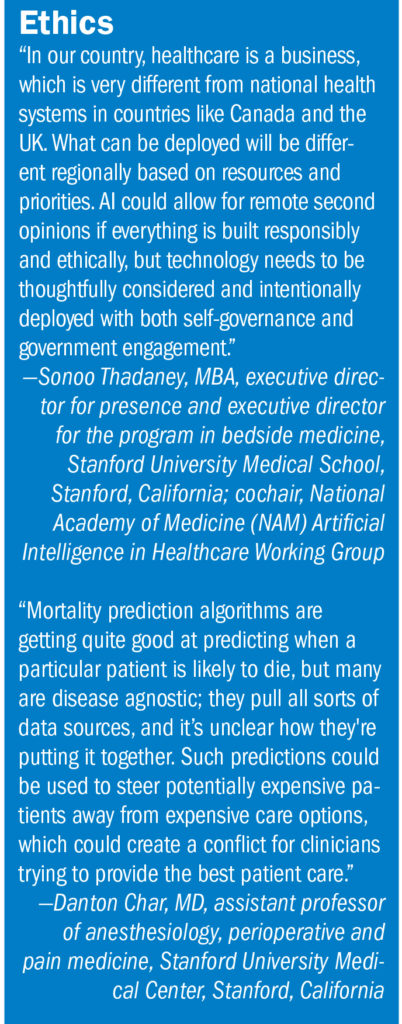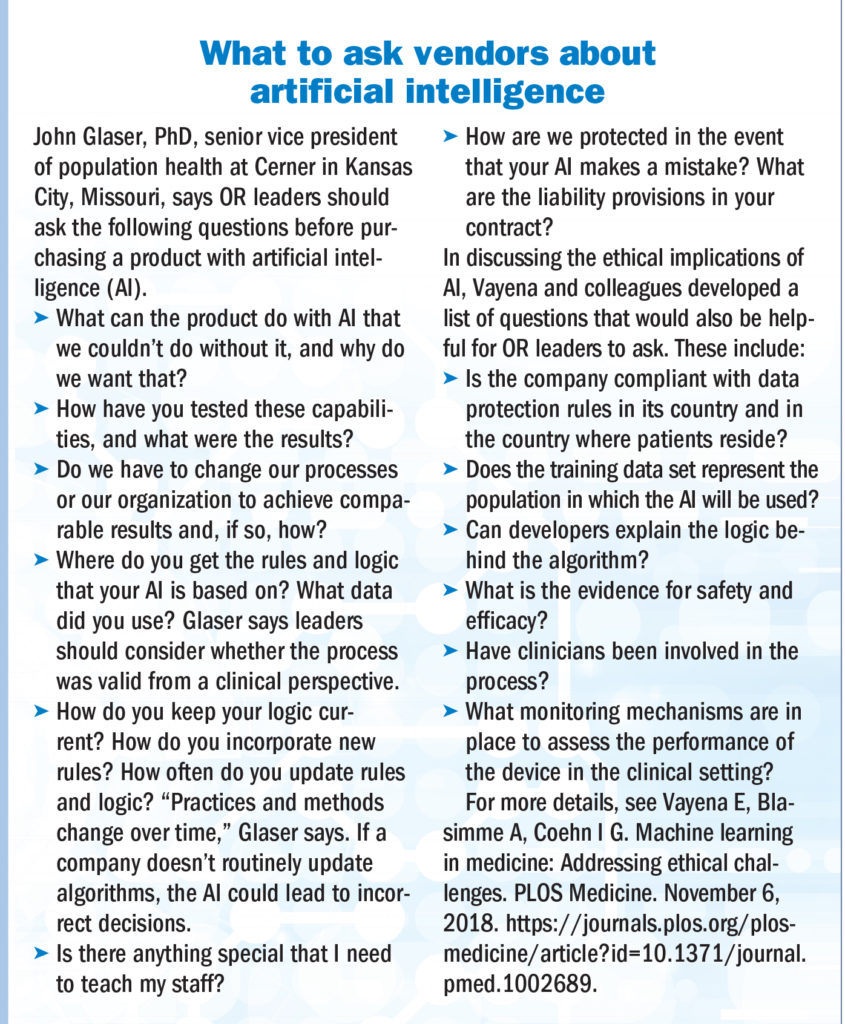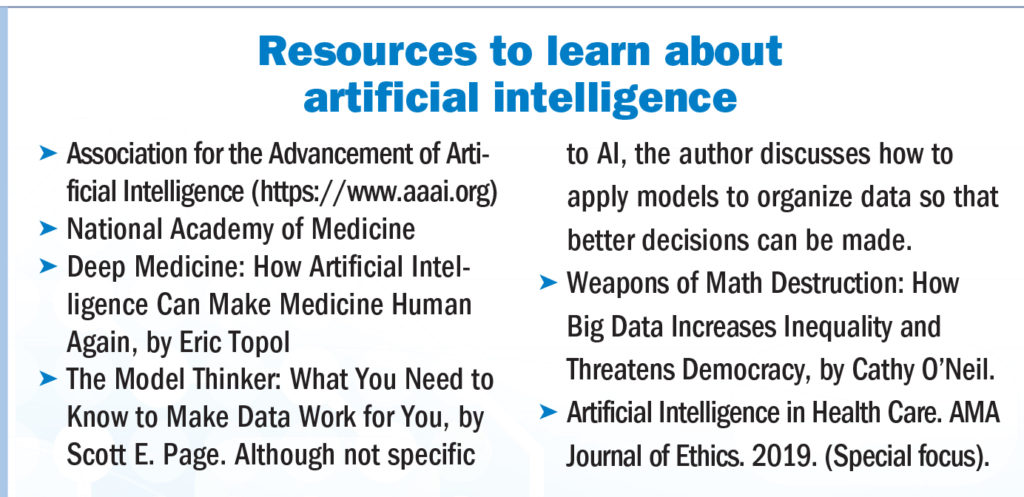 This article concludes OR Manager's special series on artificial intelligence (AI). Parts 1 and 2 (May 2019 and June 2019) introduced AI, defining the different types of technology and describing its many current and potential applications for surgery. The series also presented examples of AI (June and July 2019). We conclude with a look at challenges for implementing AI. This article discusses what OR leaders need to consider at this stage of AI development and provides thoughts on future directions from several of those interviewed for this series.
This article concludes OR Manager's special series on artificial intelligence (AI). Parts 1 and 2 (May 2019 and June 2019) introduced AI, defining the different types of technology and describing its many current and potential applications for surgery. The series also presented examples of AI (June and July 2019). We conclude with a look at challenges for implementing AI. This article discusses what OR leaders need to consider at this stage of AI development and provides thoughts on future directions from several of those interviewed for this series.
Artificial intelligence is positioned to be a game changer in perioperative care, as the articles in this series have described. Some innovations are already here, and others lie in the future. What can OR leaders be doing now to ensure that they and their organizations keep up with AI trends and properly evaluate products claiming to have AI? The answers include asking the right questions, making connections, learning, and engaging staff.
Ask the right questions
OR leaders need to ask the right questions before purchasing an AI product. As with any new product, the first question is whether it's needed. "You don't buy AI by itself," says John Glaser, PhD, senior vice president of population health at Cerner in Kansas City, Missouri. "AI is part of something else, and it should help that something else perform better." For example, if AI in an MRI machine can detect problems earlier and solve them before the machine fails, that would provide value.
"You want to be sure you're using AI for the right reasons," adds Whende Carroll, MSN, RN-BC, founder of Nurse Evolution, a company that looks at how healthcare technology, data analytics, and innovation concepts can be used to improve health and how healthcare is delivered. "Consider what question you are trying to answer and what you can get out of it [AI]." For example, if staffing isn't an issue, an OR leader should not spend money on computerized AI-based staffing models. Instead, focus on areas where care is  more expensive and intense, for instance, integrating AI into the electronic health record so that sepsis is detected earlier.
more expensive and intense, for instance, integrating AI into the electronic health record so that sepsis is detected earlier.
Glaser says that one of the goals when questioning vendors about products with AI is to determine whether the company engaged in good manufacturing processes. "You want to know what processes are being used to make sure [the product] is as good as it can be," he says (sidebar at right). Those should include using subject matter experts when developing algorithms, conducting extensive testing, and tapping into large volumes of quality data.
Carroll says that data questions boil down to three considerations: sources, quality, and volume. "The questions we need to be asking are: Who is giving us the data? What is the quality of the data? and What is the volume of data?" she says.
Make connections
"AI is just one of the many technical challenges OR leaders have," says Patricia Seifert, MSN, RN, CNOR, FAAN, independent cardiac consultant in Falls Church, Virginia. She recommends OR leaders build relationships with information technology (IT) staff. "Befriend technology people," she says. "Invite them to talk to staff." OR leaders can then offer to send a staff member to talk to IT personnel to provide insight into the OR. "Education doesn't solve everything, but sharing your knowledge is one of the greatest gifts you can give someone," Seifert says.
Seifert also recommends talking to current vendors about what they have planned related to AI, and to insurers, who usually stay current on developments like AI that can impact costs. "The next time you have lunch with your major suppliers, ask them what role they see AI playing," Glaser adds.
Learn
 "Anytime there is a major technology shift [as is the case with AI], you want to start getting some education about how mature the technology is, whether it's worth the expense, and other information," Glaser says. Reading and conferences can help boost knowledge (sidebar at right).
"Anytime there is a major technology shift [as is the case with AI], you want to start getting some education about how mature the technology is, whether it's worth the expense, and other information," Glaser says. Reading and conferences can help boost knowledge (sidebar at right).
"Clinicians should know enough about AI systems to know where they're reliable and where they're weak," says Wendell Wallach, senior advisor to the Hastings Center in Garrison, New York, author of A Dangerous Master: How to Keep Technology from Slipping Beyond Our Control,and chair of technology and ethics studies at the Yale Interdisciplinary Center for Bioethics in New Haven, Connecticut.
Danton Char, MD, assistant professor of anesthesiology, perioperative and pain medicine at Stanford University Medical Center in Stanford, California, says knowledge will help in assessing products and their appropriate use. "They [clinicians] must adequately understand how algorithms are created, critically assess the source of the data used to create the statistical models designed to predict outcomes, understand how the models function, and guard against becoming overly dependent on them," he says.
Encourage staff participation
 Data has to be annotated before it can be used as part of an algorithm to help a computer learn a task. Daniel Hashimoto, MD, MS, surgical artificial intelligence and innovation fellow at Massachusetts General Hospital in Boston, uses the analogy of wanting a computer to identify cats. Before giving the cat photos to the computer, someone has to ensure that the photos show cats and not, for example, dogs or horses. Because nurses know what is occurring in the OR at any given time, they can easily annotate the major steps in videos of surgical procedures, for instance, when the surgeon is making an incision or inserting a port. (Surgeons would likely be needed to annotate small steps and anatomical structures.)
Data has to be annotated before it can be used as part of an algorithm to help a computer learn a task. Daniel Hashimoto, MD, MS, surgical artificial intelligence and innovation fellow at Massachusetts General Hospital in Boston, uses the analogy of wanting a computer to identify cats. Before giving the cat photos to the computer, someone has to ensure that the photos show cats and not, for example, dogs or horses. Because nurses know what is occurring in the OR at any given time, they can easily annotate the major steps in videos of surgical procedures, for instance, when the surgeon is making an incision or inserting a port. (Surgeons would likely be needed to annotate small steps and anatomical structures.)
"Those steps are valuable when we think about how we're able to analyze operative documentation in the future," Dr Hashimoto says. The annotation will help the algorithm learn how it can identify steps on its own, thus speeding analysis.
Staff should also be involved in evaluating AI products being considered for purchase. Seifert notes that OR staff (and leaders) need to work with developers to ensure that algorithms reflect the non-linear aspects of AI because the responses of surgical patients are often unpredictable. "OR managers can provide very valuable insights and information to programmers and their colleagues," she says. "Nurses should be ready to make the case to programmers about why their input is valuable."
Future directions
Healthcare organizations and businesses continue to explore how AI fits into the world of healthcare. For example, in March, the Cleveland Clinic launched the Center for Clinical Artificial Intelligence. OR leaders will need to closely watch trends and, in some cases, participate in AI development, to help AI fulfill its promise without succumbing to its perils.
The goal of this series has been to give OR leaders insights into the exciting field of AI, particularly as it relates to surgery. Seifert offers parting advice to OR leaders: "AI is a tool, not a final decision maker. Do not give up your very important ethical, clinical, and professional leadership role in helping patients achieve the best possible outcomes." ✥
Cynthia Saver, MS, RN, is president of CLS Development, Inc, Columbia, Maryland, which provides editorial services to healthcare publications.
References
Glaser J. Artificial intelligence: The next revolution in information technology. AHA Trustee Insights. July 2018. https://trustees.aha.org/healthit/articles/artificial-intelligence-glaser
Glaser J. Understanding artificial intelligence in health care. American Hospital Association. January 23, 2018. https://trustees.aha.org/healthit/articles/artificial-intelligence-glaser.
Grace K, Salvatier J, Dafoe A, et al. Viewpoint: When will AI exceed human performance? Evidence from AI experts. J Artif Intell Res. 2018; 729-754.
Lineaweaver N. Cleveland Clinic has launched the Center for Clinical Artificial Intelligence. Business Insider. 2019. https://www.businessinsider.com/cleveland-clinic-artificial-intelligence-center-2019-3.


